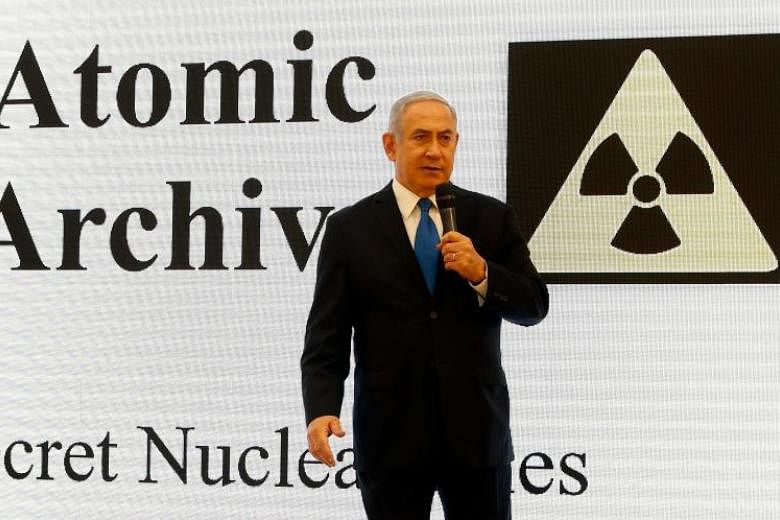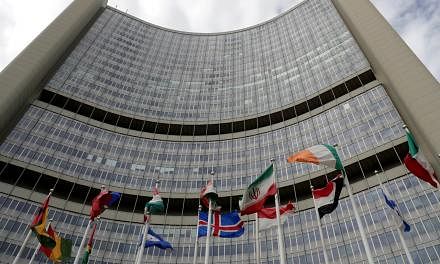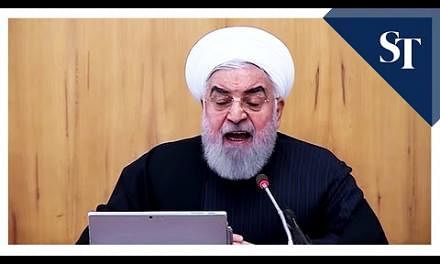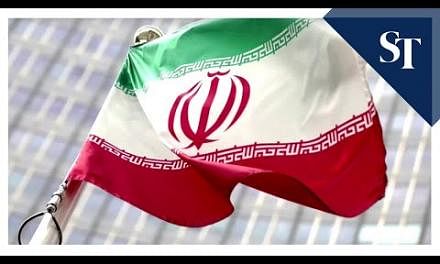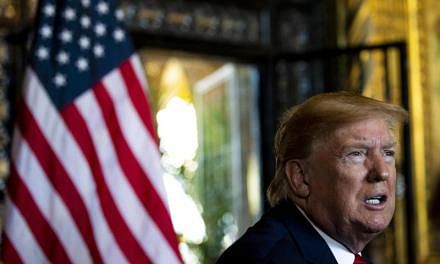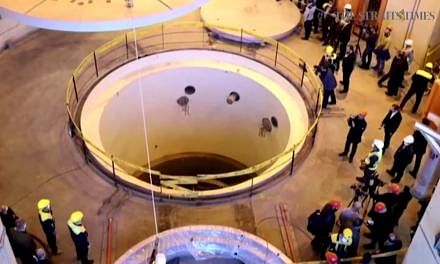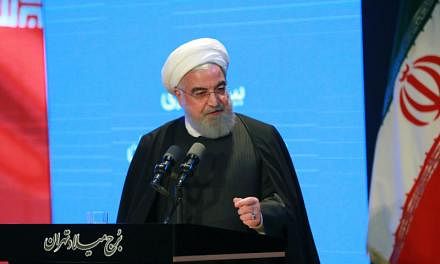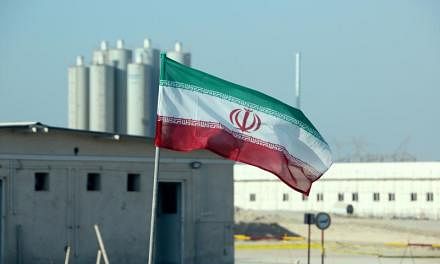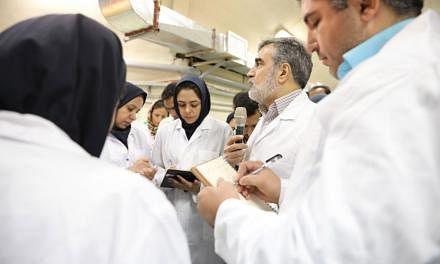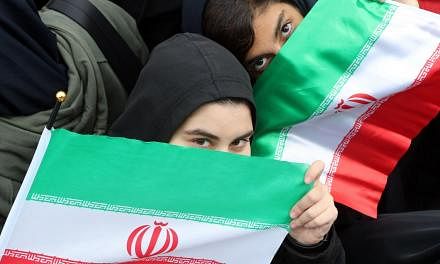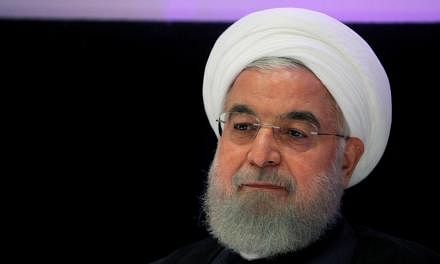TEL AVIV - Israel's Prime Minister Benjamin Netanyahu put on a theatrical presentation this week to convince the world that a nuclear deal signed by Iran and six world powers has to be scrapped, but one crucial missing element was missing from his presentation.
On Monday (April 30), less than two weeks before a May 12 deadline by which US President Donald Trump will decide whether to pull the US out of the deal, Mr Netanyahu went live on Israeli TV to present new "proof" of an Iranian nuclear weapons plan that could be activated at any time.
Dramatically pulling black drapes off a shelf filled with folders and a wooden board full of CDs, he literally unveiled one of the most successful operations in the history of Mossad.
Israel's foreign intelligence agency had appropriated about half a ton of highly classified material from Iran's nuclear archive located in a warehouse in southern Tehran, he claimed.
The documents allegedly prove one thing: that Iran has repeatedly lied to the world and the international nuclear watchdog, the International Atomic Energy Agency (IAEA), about its nuclear ambitions and has been trying secretly to put together a nuclear bomb.
The Israeli Prime Minister said the documents proved that the Iranian authorities had set up an organisational infrastructure for the development of atomic bombs; that they designed nuclear bombs, scouted possible sites for nuclear weapons testing and attempted to design nuclear warheads for missiles in their arsenal.
This, Mr Netanyahu claimed, left room for only one conclusion: When Iranians told the IAEA that they had never had a nuclear weapons programme, they were blatantly lying.
He also insinuated that Iran may still be misleading the world.
The former head of "Amad", the Iranian nuclear project, is heading a new organisation with the name of SAPAND today, still working with the very same team, presumably with identical purpose, he argued.
Yet, the one thing that could have helped Mr Netanyahu convince the world to not only fix but also nix the Iran deal was missing from his rhetorically impressive presentation: Clear, new evidence that Iran is violating the Atomic Energy Treaty today.
"Most of the information Netanyahu presented was not new," Dr Emily Landau, head of the arms control programme at the Institute for National Security Studies in Tel Aviv, told The Straits Times in a phone interview.
Former inspectors of the IAEA later claimed the very same. The essence of what Mr Netanyahu said was already published in a 2015 IAEA report about the possible military dimensions of the Iranian nuclear programme.
The report tracked Iran's nuclear programme up to 2009. The material Netanyahu showed had no dates affixed to it, but apparently did not reveal Iranian activities after the signing of the nuclear deal, called the Joint Comprehensive Plan of Action (JCPOA), in 2015.
In other words, Western intelligence agencies and heads of state already knew everything Mr Netanyahu "uncovered", albeit not with the same level of detail and certainty as Israel's intelligence agencies can now provide.
The same applies to Mr Netanyahu's warnings about Iran's missile programme. One does not need secret documents to understand the true intentions motivating its build-up. Military experts say that missiles with a payload of 500kg and a range of more than 1,000km make little sense if they are equipped only with conventional warheads. The damage that several dozen such projectiles could inflict if launched against a powerful enemy like Israel would not be great enough to justify the massive investment in Iran's missile programme. The world has recognised this long ago, which is why some sanctions against Iran remain in force as long as Teheran sticks to its missile programme.
It is unlikely that Mr Netanyahu convinced supporters of the JCPOA in Europe to rescind the agreement on May 12, or to renegotiate it completely.
European governments reacted cautiously, so Israel sent out emissaries to share the most important materials with Germany, France and Britain.
So far, it is not even clear if Mr Netanyahu succeeded in persuading Mr Trump to withdraw from the deal, though the US leader has been an outspoken critic of the agreement from the start.
Mr Netanyahu's most important charge is that the nuclear treaty clears Iran's path to uranium enrichment in the near future. These constraints are supposed to fade out by 2030. Then, Iran, with its proven nuclear ambitions and ready-made weaponisation plans, could legally begin to put all components for an atomic bomb in place.
To this, Mr Netanyahu's detractors maintain that at least for the next 12 years, Iran will remain subject to very strict supervision and not be able to amass enriched uranium - unlike before the agreement when Iran was able to stockpile tons of this material.
Still, one thing that the Israeli Prime Minister's presentation succeeded in doing was to impress on many experts that the deal needs mending.
Dr Landau said to sign the JCPOA, the signatories - the US, Britain, France, China, Russia and Germany - basically agreed that "the world should forget about Iran's past to enable Teheran to sign the agreement and save face".
She added: "They allowed them to formulate a false narrative that states that they have never broken the nuclear non-proliferation treaty - which simply is not true."
Israel's Prime Minister also conveyed another important message. He demonstrated just how capable and resourceful Israel's intelligence community is.
The operation inside Teheran has shown the Mossad's reach deep into the most secretive corners of the Iranian regime.
Even if Israel's spies did not provide proof that Iran is violating the nuclear treaty today, the agents still pulled off a coup: First, they unmasked the Iranian regime's charm offensive as a campaign full of at best misleading statements. Iran's leaders have repeatedly gone on record stating that they never had a nuclear weapons programme, and that pursuing the development of an atomic bomb ran afoul of their ideology. Proving they have knowingly lied might help Mr Netanyahu's diplomatic efforts in the future.
Second, the Mossad's success is likely to unsettle many mullahs in the Islamic Republic. They will surely begin a witch-hunt in their own quarters.
And they will most probably think twice now before striking at Israel or breaking the JCPOA, as they cannot be sure what kind of intelligence Mr Netanyahu's agents are able to find before their Premier's next dramatic briefing.

